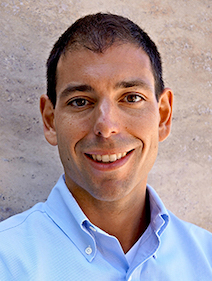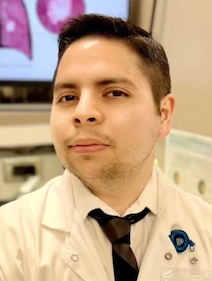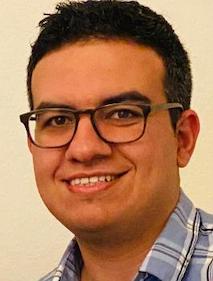Each year, LCRF awards research grants to around the world that demonstrate promise and ingenuity in their work. These investigators, selected from hundreds of applicants, represent some of the brightest minds committed to improving outcomes for lung cancer patients. Coming from various career paths including scientists, physicians, students, and fellows, and working on a variety of innovative research projects related to lung cancer, we are proud to include them in our portfolio of currently funded projects, which you can learn more about below. View our full portfolio of previously funded research here.
2024 LCRF Leading Edge Research Grant Program
2024 William C. Rippe Award *
Lindsay LaFave, PhD
Albert Einstein College of Medicine
RESEARCH PROJECT:
Investigating chromatin-mediated mechanisms of immune response in lung cancer
*This project was awarded the LCRF William C. Rippe Award for Distinguished Research in Lung Cancer, acknowledging the investigator whose proposal not only demonstrated exceptional scientific merit but also exemplified an enduring commitment to making an impact in the field of lung cancer research.
SUMMARY:
This research focuses on understanding how lung adenocarcinoma, particularly in smokers, develops and progresses. Using advanced organoid and mouse models, the study explores how alveolar type 2 (AT2) cells and immune cells interact under the influence of the key regulator CEBPA. By investigating how chronic inflammation and immune responses drive cancer development and affect treatment outcomes, the project aims to improve current therapies and develop new strategies, benefiting both smokers and non-smokers with lung cancer. This could lead to new therapeutic rationales for both smokers and non-smokers.

2024 James B. Dougherty, MD Award *
Dian Yang, PhD
Columbia University Irving Medical Center
RESEARCH PROJECT:
Investigating the molecular basis of cancer plasticity in LKB1-mutant lung adenocarcinoma
*This project was awarded the James B. Dougherty, MD Award for Scientific Merit acknowledging the investigator whose proposal was selected for outstanding overall merit by LCRF’s Scientific Advisory Board.
SUMMARY:
This project aims to understand how aggressive lung adenocarcinomas develop and how they adapt to treatment. LKB1-deficient tumors are a type of lung cancer that can adapt and resist treatment through a process called cell plasticity, in which cancer cells switch states to survive challenges. They will investigate how LKB1-deficient tumors influence this plasticity, focusing on a stage called the pre-EMT state, which may drive disease progression and drug resistance. Using advanced mouse models that closely mimic human tumors, the study aims to uncover the unique genetic mechanisms behind LKB1-deficient tumors. These findings could enhance our understanding of lung cancer and lead to new therapeutic strategies to target these aggressive tumors.

2024 LCRF Research Grant on Early Detection and Pre-Neoplasia in Lung Cancer
Peggy Hsu, MD, PhD
University of Michigan
RESEARCH PROJECT:
Understanding the origin of ALK-driven lung cancer
SUMMARY:
ALK-positive lung cancer, often affecting non-smokers and diagnosed at advanced stages, has unclear origins. This research aims to uncover the earliest events driving ALK-driven lung cancer using advanced single-cell technologies. By studying patient samples, lung organoids, and mouse models, the team will map how ALK activation leads to tumor initiation. The findings could reveal novel molecular features, enhance our understanding of cancer cell plasticity, and pave the way for earlier detection and prevention strategies, improving survival rates for ALK+ lung cancer patients.

2024 LCRF Research Grant on Understanding Resistance in Lung Cancer
Megan Burger, PhD
Oregon Health & Science University
RESEARCH PROJECT:
Optimizing immunotherapy sequencing to overcome resistance
SUMMARY:
This project aims to enhance cancer immunotherapy by combining immune checkpoint blockade (ICB) therapy with cancer vaccines to overcome resistance and extend the benefits of treatment to more patients. Using a mouse model of lung adenocarcinoma, the study will explore how these therapies work together, optimizing vaccine dosing and timing relative to ICB treatment for maximum effectiveness. The findings could inform clinical trials, improve response rates, prevent disease recurrence, and ultimately lead to better outcomes for lung cancer patients.

William Feng, PhD
Dana-Farber Cancer Institute
RESEARCH PROJECT:
Targeting AP-1 in KRAS-mutant lung cancer
SUMMARY:
This research explores a potential weakness in lung cancer by targeting AP-1, a group of transcription factors that act as an “on/off switch” for genes essential to cancer cell survival. Previous studies show that EGFR-mutant lung cancers rely on AP-1 for resistance to therapies, and this study investigates whether KRAS-mutant lung cancers do the same. The project will evaluate AP-1 as a drug target, test whether inhibiting it can effectively treat KRAS-mutant lung cancers and develop a new drug to block AP-1 function. This work could lead to groundbreaking therapies for currently untreatable lung cancers.

2024 LCRF Minority Career Development Award (CDA) in Lung Cancer
2024 Cynthia M. Page Merit Award *
Tikvah Hayes, PhD
David Geffen School of Medicine at UCLA
RESEARCH PROJECT:
Advancing preclinical cell line diversity and decoding TKI-resistance landscapes in EGFR-mutant lung cancer
*This project was awarded the Cynthia M. Page Merit Award for Innovation in Lung Cancer, which is awarded to the investigator whose proposal demonstrates exceptional scientific merit and groundbreaking innovation, pushing the boundaries of lung cancer research with creative, forward-thinking approaches.
SUMMARY:
Treatment resistance remains a major challenge for patients with EGFR-mutant lung cancer. This project aims to shed light on how different mutations in EGFR affect cellular biology and response to treatment. The team will develop new models to study understudied mutations and use advanced genetic techniques to identify mutations that cause resistance to current therapies. By uncovering these mechanisms, the study could lead to better treatments and improved outcomes for patients with EGFR-mutant lung cancer, advancing the field of lung cancer research.

Luisa Escobar-Hoyos, MSc, PhD
Yale University
RESEARCH PROJECT:
Altered RNA splicing as a driver of Osimertinib resistance in lung cancer
SUMMARY:
Resistance to Osimertinib is a significant challenge with 40-50% of cases lacking a clear genetic cause. This project will investigate whether alternative pre-mRNA splicing (AS) – a process where cells alter RNA to change protein production – might explain this resistance. Lung cancers are known to have widespread changes in AS compared to healthy tissue, suggesting it could play a role. This research will explore how AS differs in resistant vs. sensitive cancers and test whether blocking AS with a drug can restore sensitivity to Osimertinib, potentially leading to new treatment strategies for resistant lung cancers.

2024 IASLC/LCRF Team Science Award on Advancing Therapies Towards Curing Oncogene-Driven Lung Cancers
David A. Barbie, MD
Dana-Farber Cancer Insititute
Aaron Hata, MD, PhD
Massachusetts General Hospital
Eric Smith, MD, PhD
Dana-Farber Cancer Institute
Pasi Jänne, MD, PhD
Dana-Farber Cancer Institute
Shunsuke Kitajima, PhD
Japanese Foundation for Cancer Research
RESEARCH PROJECT:
Immune elimination of drug tolerant persister cells in oncogene-driven lung cancer
SUMMARY:
Lung cancer remains one of the deadliest cancers worldwide, particularly in its advanced stages. Metastatic non-small cell lung cancer (NSCLC) patients face poor prognoses despite recent advances in targeted therapies against EGFR, ALK, and KRAS mutations. These therapies, although initially effective, often lead to relapse driven by drug-tolerant persister (DTP) cells that develop resistance. Our research aims to tackle this critical challenge, focusing on innovative immune-based strategies to eradicate these persistent cells and improve patient outcomes.
Our project is aimed at exploiting vulnerabilities in DTP cells leveraging activating the innate immune programs and targeting of cell surface markers making them susceptible to immune attack. By leveraging our expertise in patient-derived models, targeted therapy, and immunotherapy, we propose a multi-faceted approach to target DTP cells, utilizing cutting-edge CAR T-cell therapy and modulation of the tumor microenvironment (TME).
Project 1: Co-opting innate immunity to eliminate drug tolerant persister cells
Project 1 aims to co-opt innate immunity by inhibiting TREX1, a negative regulator of STING-IFN signaling, to enhance immune response against DTP cells. Preliminary data suggest that TREX1 inhibition can unleash a potent antiviral response, making DTP cells vulnerable to immune attack. By targeting this pathway, we hope to stimulate a robust immune response capable of eliminating these resistant cells.
Project 2: Enhancing CAR T cells to eliminate drug tolerant persister cells
Project 2 focuses on enhancing CAR T cellular therapy to specifically target DTP cells in EGFR mutant NSCLC. While traditional CAR T therapies face challenges in solid tumors due to off-target toxicity and poor Tcell infiltration, our approach incorporates a novel strategies to address and overcome both these limitations.
Our research is poised to make significant strides in the treatment of metastatic NSCLC. The success of this project could rapidly translate into first-in-human clinical trials, offering new hope for patients who have exhausted other treatment options. Our group has a track record of working collaboratively, as well as translating discoveries from lab into clinical trials which have led to improved the lives of patients by offering more effective and less toxic therapies. By advancing our understanding and ability to combat DTP cells, we aspire to turn the tide against this resilient form of cancer and pave the way for more effective, long-lasting treatments for lung cancer patients.

2023 LCRF–Daiichi Sankyo–AstraZeneca Research Grant on Antibody Drug Conjugates
Aakash Desai, MD, MPH
University of Alabama at Birmingham
RESEARCH PROJECT:
Deciphering the ADC Code: A Proteogenomic Quest in Lung Cancer
SUMMARY:
This research project aims to improve the treatment of Non-Small Cell Lung Cancer (NSCLC) using a special kind of therapy called Antibody-drug conjugates (ADCs). These therapies are designed to target cancer cells more precisely. However, it’s not fully understood why some patients respond better to these treatments than others. The focus of this project is to study a particular target on cancer cells, known as Trop-2, and to figure out how its presence or absence affects the success of the therapy. By examining the characteristics of cancer cells and their surrounding environment in great detail, the project hopes to find out which patients are more likely to benefit from ADCs. This could lead to more personalized and effective treatments for lung cancer.

Carl Gay, MD, PhD
University of Texas M.D. Anderson Cancer Center
RESEARCH PROJECT:
Pulmonary high-grade neuroendocrine carcinomas as indications for antibody-drug conjugates targeting TROP2 and HER2
SUMMARY:
Small cell lung cancer (SCLC) and large-cell neuroendocrine carcinoma (LCNEC) are similarly aggressive lung cancers with poor prognosis due, in part, to limited personalized treatment options. Preliminary data demonstrate that TROP2 and HER2 are viable targets for treatment of these malignancies if the correct patients are selected. Antibody-drug conjugates targeting TROP2 and HER2 rely upon both expression of the antibody’s target and sensitivity to the drug to which the antibody is conjugated – each of which is heterogeneous in SCLC and LCNEC. This proposal highlights a strategy to delineate the precise patient population to which to apply these agents making use of an unparalleled collection of patient samples and patient-derived models for validation.

Nan Sethakorn, MD, PhD
Loyola University of Chicago
RESEARCH PROJECT:
Leveraging liquid biopsy to identify the optimal clinical niche for Trop2-targeting in NSCLC
SUMMARY:
A new class of treatments in lung cancer are antibody-drug conjugates (ADCs) that work by detecting proteins on cancer cells. One target is Trop2, a protein found in many cancer cells. Trop2-ADCs show promising anti-tumor activity, but treatments often stop working, or do not work in everyone. Often, as patients receive treatments, their tumors develop changes that allow them to adapt, but often it is difficult to get a sample. New technologies that can analyze tumor cells circulating in blood are thus a way to obtain a “liquid biopsy” through a simple blood draw. This project will study three markers: Trop2, PD-L1, and schlafen-11, in circulating tumor cells, and may identify patients who may benefit from Trop2-ADCs either alone or in combination with currently existing immunotherapy.

2023 LCRF Leading Edge Research Grant Program
2023 William C. Rippe Award *
Francisco Expósito, PhD
Yale University
RESEARCH PROJECT:
Investigating novel synthetic lethal vulnerabilities in EGFR-driven lung cancer
*This project was awarded the LCRF William C. Rippe Award for Distinguished Research in Lung Cancer, acknowledging the investigator whose proposal not only demonstrated exceptional scientific merit but also exemplified an enduring commitment to making an impact in the field of lung cancer research.
SUMMARY:
Lung cancers driven by mutations in EGFR represent between 15-60% of lung adenocarcinomas. The presence of EGFR mutations predicts the response to specific therapies referred to as tyrosine kinase inhibitors (TKIs). Although these inhibitors have revolutionized the way we treat this type of cancer, patients have varied responses and eventually, all tumors will become resistant and stop responding, highlighting the need for alternative treatment options.
In this project, we aim to understand how the loss of SETD2 hinders EGFR-driven tumor growth to leverage these findings to create new precision treatments for the treatment of patients with EGFR-mutant tumors.
“I am really honored to receive the William C. Rippe Award for Distinguished Research in Lung Cancer from the Lung Cancer Research Foundation. Thanks to the support from LCRF we hope to uncover novel genetic vulnerabilities of EGFR-driven lung tumors and leverage these findings to implement and inform new precision-based treatments for this type of tumors in the future.”

Benjamin Morris, PhD
University of Texas M.D. Anderson Cancer Center
RESEARCH PROJECT:
Deep whole genome sequencing of circulating tumor DNA for studying evolution and therapy resistance in small cell lung cancer
SUMMARY:
While most small cell lung cancers (SCLCs) initially respond to a combination of chemotherapy and immunotherapy, resistance often develops quickly. It is currently unknown how these cancers evolve to escape standard of care treatment. In this project, we will use cancer DNA collected from small blood draws to study how SCLC evolves following treatment. Our work will identify changes in cancer DNA and gene expression that drive resistance. We will also determine if resistant tumors are composed of one population of resistant cells or if multiple, hard to treat populations emerge after treatment to drive resistance. By identifying how SCLC cells change following initial treatment, our work will help identify new ways to better treat resistant SCLC in the clinic.

2023 LCRF Research Grant on Understanding Resistance in Lung Cancer
Trever G. Bivona, MD, PhD
University of California San Francisco
RESEARCH PROJECT:
Characterization and therapeutic targeting of a tumor-tumor microenvironment network promoting resistance to targeted therapy in lung cancer
SUMMARY:
The overall goal we aim to achieve in this project is to create an entirely new approach to treat lung cancer by developing a suite of precision therapies that are distinct in their mechanism of action against the tumor ecosystem and improve the effectiveness of current therapies against mutant EGFR, KRAS, and ALK as combination therapies, while critically maintaining safety and quality of life for patients. The work accomplished in this project could yield molecular treatments that better control, or potentially cure, lung cancer safely through improved precision medicine in the relatively near future.

Ann Pendergast, PhD
Duke University School of Medicine
RESEARCH PROJECT:
Uncovering novel vulnerabilities to treat SCLC therapy resistance
SUMMARY:
Small cell lung cancer (SCLC) is a highly aggressive neuroendocrine lung cancer that is typically metastatic upon diagnosis. The overall 5-year survival rate for SCLC patients is only ~7%, and has remained unchanged for over 30 years. Therefore, there is an urgent need to define the molecular mechanisms that promote metastatic SCLC in order to identify effective treatment strategies to treat this deadly cancer. The Pendergast laboratory recently found that pharmacologic inhibition of ABL kinases with ABL-specific inhibitors impairs SCLC metastasis in mouse models, resulting in prolonged animal survival. This proposal will evaluate whether ABL kinase inhibition sensitizes SCLC to therapies targeting stress response pathways, and/or to metabolic inhibitors.

2023 LCRF Minority Career Development Award (CDA) in Lung Cancer
2023 James B. Dougherty, MD Award **
Lloyd Bod, PhD
Massachusetts General Hospital
RESEARCH PROJECT:
Harnessing B cell specific checkpoint molecules in lung cancer
**This project was awarded the James B. Dougherty, MD Award for Scientific Merit acknowledging the investigator whose proposal was selected for outstanding overall merit by LCRF’s Scientific Advisory Board.
SUMMARY:
Immunotherapy has transformed the paradigm of lung cancer treatment, yet its efficacy remains restricted, benefiting only a minority of patients—typically, two to four individuals out of every ten. Dr. Bod’s research focuses on unraveling the functions of B cells, a critical component of the immune system. These cells are abundant in lung tissue and hold the capacity to assist T cells in their anti-cancer activities while directly combatting cancer cells themselves. This translational project’s objective is to leverage genomics to identify and assess new molecules present on B cells, which could serve as innovative immunotherapy targets, thereby paving the way for new therapeutic strategies in lung cancer.
“This award fuels our quest to explore B cells in lung cancer, aiming to unlock groundbreaking treatments. I’m deeply grateful for the recognition.”

Luis Prieto, PhD
Mayo Clinic
RESEARCH PROJECT:
Impact of senescent cells on lung tumorigenesis
SUMMARY:
Dr. Prieto is studying naturally occurring senescent (aging) cells to determine if they promote late-life development of lung cancer. Aging cells accumulate and promote the development of lung tumors by suppressing immune T cells. He will then use treatments aimed at killing senescent cells to see if this effects the formation and/or growth of tumors.

2023 LCRF Research Grant on Early Detection and Pre-Neoplasia in Lung Cancer
Darren Chiu, MD, MMSc
Boston University
RESEARCH PROJECT:
The Spatial B Cell Landscape in Lung Squamous Premalignant Lesions
SUMMARY:
Bronchial premalignant lesions (PMLs) develop in the airway from cellular and molecular changes, and they are precursor lesions of lung squamous cell carcinoma. While some PMLs progress to cancer, some of them regress spontaneously or remain stable. The presence and distribution of B cells in lung cancer has been associated with prognosis and survival, however, the role of B cells in the lung premalignancy is poorly understood. Using single cell sequencing technology and multiplex multiomic imaging, we will identify B cell subpopulations in bronchial PMLs and characterize the spatial microenvironment that recruits and modulates B cells associated with PMLs severity and progression. The findings are expected to reveal new biomarkers for early diagnosis or interception of lung cancer.

2022 LCRF Pilot Grant Program
Bingnan Zhang, MD
University of Texas MD Anderson Cancer Center
RESEARCH PROJECT:
Harnessing DLL3 as a CAR T target in small cell lung cancer
SUMMARY:
Small cell lung cancer (SCLC) is a highly aggressive type of lung cancer with limited therapeutic options. Chimeric antigen receptor (CAR) T-cell therapy a “living”, personalized drug, that modifies a patient’s own immune cells to target and kill cancer cells. Dr. Zhang and her team have developed a novel CAR T against a SCLC surface protein target DLL3. In this project, Dr. Zhang and her team will investigate the efficacy of the DLL3 CAR T and its potential resistance mechanisms in patient-derived mouse models. The goal of this research is to ultimately inform the design of clinical trials using DLL3 CAR T and its combination approaches to benefit patients with SCLC.

2022 LCRF Minority Career Development Award (CDA) in Lung Cancer
Carla Concepcion, PhD
Columbia University Irving Medical Center
RESEARCH PROJECT:
Targeting SMARCA4-deficient lung cancers
SUMMARY:
SMARCA4 alterations occur in 10% of NSCLC, are associated with poor patient outcomes, but have yet to lead to targeted therapies. SMARCA2 has emerged as a promising therapeutic target in SMARCA4-mutant lung cancers. SMARCA4 inactivation results in a dependence on SMARCA2 for cells to proliferate; thus, small molecules against SMARCA2 have been developed. Yet, the existence of highly aggressive lung cancers deficient for both SMARCA4 and SMARCA2 demonstrates that dual loss can be tolerated by proliferative cancer cells. In this project, Dr. Concepcion and her group will (1) determine the precise roles of SMARCA2 in the progression of SMARCA4-deficient lung cancers and (2) identify the molecular mechanisms that permit cells to proliferate in the absence of both SMARCA4 and SMARCA2.

2022 LCRF Research Grant on Early Detection and Pre-Neoplasia in Lung Cancer
Mohammad Shahrokh Esfahani, PhD
Stanford University
RESEARCH PROJECT:
Noninvasive prediction of local recurrence in localized NSCLCs after CRT
SUMMARY:
Nearly half of non-small cell lung cancer patients are diagnosed with localized disease, making them candidates for chemoradiotherapy (CRT) as curative treatment. Among these, CRT is the main treatment for stage III patients, of whom, ~30% will experience local recurrence. Despite advances utilizing tumor imaging techniques to improve targeting, no further personalization is done based on tumor biology to refine radiation strategy. Therefore, relevant biomarkers to predict treatment outcome to guide and adapt CRT are lacking. We propose to address this problem by profiling cell-free DNA using state-of-the-art techniques to infer RNA expression from DNA, and thereby identify determinants of response to CRT. We envision that this noninvasive technique will help radiation personalization.

2022 LCRF–ALK Positive Research Grant
Jaime Schneider, MD, PhD
Massachusetts General Hospital
RESEARCH PROJECT:
Metabolic reprogramming as a driver of resistance in ALK+ lung cancer
SUMMARY:
Dr. Schneider is a thoracic oncologist and biomedical research who is using integrative metabolomics approaches to study lung cancer biology. She was awarded the 2022 ALK Positive Lung Cancer Research Award for her work on identifying novel mechanisms of therapeutic resistance based on tumor metabolic rewiring. Using patient-derived cell lines, orthotopic mouse models, and tumor specimens, the overall goal is to elucidate metabolic vulnerabilities in ALK+ lung cancer that may prove to be targetable for therapeutic intervention. Using state-of-the-art technologies to probe tumor metabolism, Dr. Schneider hopes to identify a new paradigm of resistance in ALK+ lung cancer in which modulation of metabolism is a clinically actionable lung cancer treatment.
Dr. Schneider’s work was published in Nature Cancer, Feb. 16, 2023.

2022 LCRF and MET Crusaders Research Grant on MET-Driven Lung Cancer
Xiuning Le, MD, PhD
University of Texas MD Anderson Cancer Center
RESEARCH PROJECT:
Optimization of MET-CAR-T/NK cell-based therapies for MET exon 14 skipping NSCLC
SUMMARY:
Chimeric antigen receptor (CAR) based cell therapy is a way to get immune cells, either T cells or NK cells to fight cancer by changing them in the lab so they can find and kill cancer cells. CAR-T cell therapies have been approved by FDA in lymphoma, but it is still slow in the solid tumor arena. For METex14 skipping and MET overexpressed lung cancer, CAR T/NK approach is particularly promising as MET antibody-based therapies have shown good clinical results. Here, we will first test if CAR T/NK cells can effectively kill METex14 tumor cells in vitro and in mouse models. Next, we will evaluate combinations to enhance the efficacy of MET targeting CAR T/NK cells, aiming to produce benefit in cancers having low- or moderate-MET levels, which can benefit more lung cancer patients.

2022 LCRF and EGFR Resisters Research Grant on EGFR-Driven Lung Cancer
2022 James B. Dougherty, MD Award*
Swarnali Acharyya, PhD
Columbia University Medical Center
RESEARCH PROJECT:
Drugging the S100A9-Retinoic acid pathway: companion biomarker and therapy
* This project was awarded the James B. Dougherty, MD Award for Scientific Merit acknowledging the investigator whose proposal was selected for outstanding overall merit by LCRF’s Scientific Advisory Board.
SUMMARY:
Metastasis to the central nervous system (CNS) is a frequent complication observed in EGFR-mutant lung cancer patients and is associated with poor prognosis, cognitive decline, morbidity, impairment of motor function and accelerated death. Despite recent advances in EGFR-TKI treatment, CNS metastasis remains a common site of treatment failure and relapse. In our recent studies (Biswas et al., Cancer Discovery, 2022), we have identified that a mechanism of brain relapse (S100A9-ALDH1A1-RA signaling axis) in EGFR-mutant lung cancer that links both drug resistance and metastasis. The goal of this proposal is to perform rigorous preclinical studies and clinical validation of the S100A9-RA axis to accelerate the clinical translation in lung cancer patients.

Luke Hoeppner, PhD
University of Minnesota, Twin Cities
RESEARCH PROJECT:
Predictive biomarkers and new therapeutic strategies to prevent EGFR TKI-refractory lung cancer progression
SUMMARY:
Lung cancer remains the leading cancer related cause of death due to the large number of patients diagnosed with advanced stage disease and the development of resistance to current therapies. The proposed research seeks to understand how lung tumor cells evade therapy-induced cytotoxicity and aims to develop new innovative strategies and therapies to predict and prevent the emergence of treatment refractory cancer progression. The collective impact of this research is providing fundamental knowledge that will improve the quality of life and clinical outcome for individuals afflicted with cancer.

Jonathan Ostrem, MD, PhD
University of California, San Francisco
RESEARCH PROJECT:
Enhancing the precision of targeted therapies for EGFR-mutant lung cancer
SUMMARY:
Targeted therapies have revolutionized the treatment of many cancers, in some cases not only prolonging survival but also causing less toxicity than untargeted chemotherapies. This has been particularly true in the case of EGFR-mutant lung cancers, where inhibitors of EGFR have dramatically improved outcomes for most patients while causing only mild side effects. However, for patients whose tumors are driven by EGFR exon 20 insertion mutations, representing up to 10% of EGFR-mutant lung cancers, available targeted therapies come with substantial side effects from blocking EGFR in healthy cells and this limits their activity against the cancer. Dr. Ostrem’s research focuses on developing an approach for tumor-specific release of EGFR inhibitors to maximize their effect on cancer cells while avoiding intolerable side effects that often prevent adequate treatment of patients.

2022 LCRF and KRAS Kickers Research Grant on KRAS-Driven Lung Cancer
Matthew Gumbleton, MD, PhD
The University of Utah
RESEARCH PROJECT:
KRAS inhibitors for the treatment of invasive mucinous adenocarcinoma
SUMMARY:
Invasive mucinous adenocarcinoma of the lung (IMA) is a unique, locally aggressive subtype of lung cancer that has generally not benefited from the recent advances in targeted therapies or immunotherapy strategies now commonly used to treat other types of lung cancer. This proposal will apply a combination of hypothesis testing and unbiased investigation to assess state of the art therapeutic strategies in the most physiologically relevant models of IMA currently available. We anticipate that these experiments will pave the way for clinical trials designed to determine optimal therapeutic strategies for patients with IMA.

2021 LCRF Pilot Grant Program
Aria Vaishnavi, PhD
University of Utah
RESEARCH PROJECT:
Elucidating the molecular mechanisms of radon-induced lung cancer through a novel mouse model
*This grant was funded in part by the Thomas G. Labrecque Foundation.
SUMMARY:
Chronic exposure to inhaled radon gas is estimated to cause 21,000 lung cancer deaths in the US annually, making it the second leading cause of lung cancer, and the leading cause of lung cancer in never smokers (LCINS). Despite this, the precise molecular, cellular and genetic changes that occur in the lung epithelium following chronic radon exposure to environmentally-relevant levels of radon gas are poorly characterized. Moreover, there are no reliable ways to identify radon-induced lung cancer in patients.
Hence, to address this critical knowledge gap, Dr. Vaishnavi’s lab will develop genetically engineered, as well as human patient-derived mouse models that will enable direct assessment of the molecular, cellular and genetic changes that occur in the lung following chronic exposure to environmentally relevant levels of radon.
The long-term goals of this work are to: dissect out a molecular signature or imprint from chronic radon exposure, novel biomarkers in mice and humans exposed to chronic levels of radon, as well as to identify critical and common genetic (oncogenic) alterations that occur at key disease stages. These may be used to identify human lung cancer patients that harbor radon-induced disease in the clinic. An improved understanding of the molecular mechanisms that drive radon-induced lung cancer may result in new or improved therapeutic strategies in this poorly understood disease.

2021 LCRF-AstraZeneca Grant Program
Giorgia Foggetti, PhD
Università Vita-Salute San Raffaele
RESEARCH PROJECT:
Dissecting the role of the KEAP1 pathway in mediating therapeutic sensitivity in EGFR-driven lung adenocarcinoma
SUMMARY:
Lung cancer is the second most common cancer type worldwide and remains an Incurable disease. EGFR is a frequent biomarker of lung cancer and is found mutated in ~15% of all cases. The presence of EGFR mutations predicts the response to specific therapies referred to as tyrosine kinase inhibitors (TKIs). The 3rd generation TKI osimertinib is the standard of care for patients with this disease and improves the survival of patients. However, this therapy does not work in all patients with the same efficacy, and for many patients osimertinib will eventually stop working, highlighting the need for alternative treatment options.
KEAP1 is a gene involved in regulating oxidative stress and detoxification processes. In EGFR mutant tumors, mutations in the pathway of KEAP1 are associated with a poorer response to TKIs and therefore worse outcomes in patients. This project aims to investigate how inactivation of KEAP1 limits the response to therapy of EGFR mutant tumors to identify specific vulnerabilities for this subset of tumors. By testing novel therapeutic agents that target these vulnerabilities, these studies will help develop new strategies in combination with osimertinib to improve the response to treatment in patients affected by EGFR mutant lung cancer and evidence of dysregulation of the KEAP1 pathway.

2019 LCRF Research Grant
on Disparities in Lung Cancer
Rajwanth Veluswamy, MD, MSCR
Icahn School of Medicine at Mount Sinai
RESEARCH PROJECT:
Assessing the mechanisms underlying the association between sex and immunotherapy response
SUMMARY:
Recently, immune checkpoint inhibitors have become a mainstay in the treatment of advanced non-small cell lung cancer (NSCLC) after demonstrating unprecedented clinical activity in several large clinical trials. However, data from a systematic analysis of these trials suggest that females may have less response to immune checkpoint inhibitors than experienced by males. If validated, this finding will highlight the need to explore new immunotherapy regimens specific for women. Furthermore, understanding differences in immunotherapy efficacy amongst females vs. males may also reveal important underlying mechanisms of therapeutic immunity and potentially even provide targets for future synergistic immunotherapy combinations. This proposal intends to use advanced statistical modeling and cutting-edge laboratory techniques to 1) determine if female sex is independently associated with decreased immunotherapy efficacy in patients with advanced lung cancer, 2) determine if differences in the pre-treatment composition of the tumor immune microenvironment (TIME) is responsible for the association of sex and immunotherapy, and 3) study the role of hormones such as estrogen as a mediator in the relationship between sex and immunotherapy response. Elucidating these potential important mediators of immunotherapy response will have significant implications in guiding the treatment and future study of immunotherapy in lung cancer.
